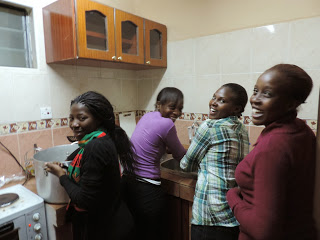Mazin Qumsiyeh* has just returned from a trip to Kenya where he facilitated four days of workshops for a group of young people (aged 18-26) who came from several countries (Tanzania, Kenya, South Sudan, Zambia, Sri Lanka).
“I like to work with young people and this also provided a chance to summarize many things that may be useful as a transition from one chapter to another,” he says. “I share with you the outline of what we discussed and did because it represents a distillation of experiences and resources that might be useful to readers whether activists or potential activists.”
“I visited and was touched by the scene at Westgate Mall in Nairobi following the recent terror attack. This and others social and political injustices are always sad statements on the status of the human species. We have a long way to continue working to get people away from wars and conflicts to peace, justice, harmony, and to take care of our suffering planet.”
Mazin also visited colleagues at the National Museums of Kenya concerning mutual interests in biodiversity and environmental research.
The workshop on activism for Palestine human rights and other issues covered are briefly outlined and further referenced on his blog:
http://popular-resistance.blogspot.hk/2013/10/kenya.html
Workshop topics
People and the Land: Developments of Canaanite agriculture, civilization, alphabets/languages, and religions. Before the wave of European Zionist colonization, Palestinians were of various religions: about 85% Muslim, 10% Christian, 5% Jewish, Bahai and others. Throughout nearly 15000 years of civilization, Palestine was and remained despite occasional failed efforts to change it) multireligious and multicultural society.
Evolution towards Zionism: Use of religion for political purposes (e.g. Crusades, Zionism). 19th century ethnocentric nationalism, European “anti-semitism” (misnamed as it is actually anti-Jewish),
Ethnic Cleansing/Refugees
How 530 villages and towns were depopulated. Complicity in this crime against humanity etc.
Human Rights Violations: many areas were discussed including attacks on water rights, education rights, freedom of movement rights (including the apartheid wall), land rights, religious rights.
Case Study of Gaza Strip: Documentary Film screening and discussion of “Gaza Strip”
Israeli Apartheid (inside and outside the Green Line) as worse than South African apartheid (Film not shown but worth showing is Roadmap to Apartheid). Israel as a colonial racist state.
Violence and Terrorism: Relevant reading
Show film and discuss “Divine Intervention”
Palestinian Political Structures and Popular Discourse
Evolution of Palestinian political discourse from the late 19th century till today. Importance of the many key uprisings (1881, 1904, 1921, 1929, 1936, 1948, 1956, 1971, 1974, 1981, 1987, 2000) to the changes in political configurations in Palestine. Palestinian constants (thawabet). Nature of the resistance in relation to corruption, political representation and exclusion etc. The negative impact of the Oslo “surrender” accords.
Palestinian culture/art/music/food
International context/law: UN resolutions (both security council and UNGA), 4th Geneva convention, Intl Convention against the crimes of apartheid and racial discrimination, Israel use of chemical and other banned weapons.
* Professor Mazin Qumsiyeh teaches and does research at Bethlehem and Birzeit Universities in occupied Palestine. He serves as chairman of the board of the Palestinian Center for Rapprochement Between People and coordinator of the Popular Committee Against the Wall and Settlements in Beit Sahour. He is author of “Sharing the Land of Canaan: Human rights and the Israeli/Palestinian Struggle” and “Popular Resistance in Palestine: A history of Hope and Empowerment”.






